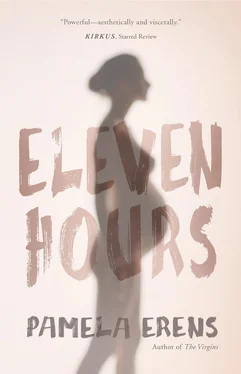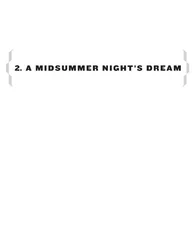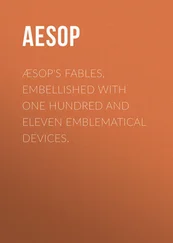During these periods Lore and Asa came over after work, bringing expensive sorbet or some other easy-to-eat treat — it was a worry, trying to get food into Julia. Clementines she enjoyed sometimes. They sat and talked to her, and Julia asked about their work and even laughed. You wouldn’t know something was so very wrong except that she would eat so little and not get out of bed. Her father, who came to sit with her, went out when they arrived, to smoke a cigarette. Later he’d tell them that the minute they left she turned her face into the pillow and became mute for the rest of the evening. They were dreamlike, those hours in Julia’s room. The lights were either dimmed very low or put up so bright they hurt Lore’s eyes. This would go on for weeks or even longer, until one day Julia would emerge like a shaky chick, go to work again, paint in her studio, cook a little something for the meals the three of them shared in Asa and Lore’s apartment.
Lore walks faster; she is not weak, is not slow. She is strong, able. Reaching the room where the man smiled at her, she peers in, but it is empty now, just a parking lot of steel and chrome. A nurse bustles by, carrying a large muffin on a paper plate — a whiff of chocolate, which normally would appeal to Lore but now makes her throat rise. Thoughts of Asa and Julia are like this smell — rich, intrusive, nauseating. In the middle term of her pregnancy Lore was nearly free from them. She felt expansive and fit, her mind full of strategy; any hated images were flimsy and fell from her easily. She was busy drawing up budgets and preparing applications for summer positions that would supplement her income. The sister of a friend at P.S. 30 ran a home day-care center that would take Soleil at three months, when Lore’s maternity leave would expire. If finances became too difficult, she would abandon the city, return to Lockport or one of the smaller towns upstate, even — why not? — Hobbes Corners. She knew now that where she’d come from was just as good in many ways as here, and what had seemed to her so entrancing about the city, so desirable — museums, clubs, offbeat films, parks and plazas filled with remarkable-looking people — no longer interested her, or at least she would have no time for them. Surely that was what had happened to her mother also, dancer or no dancer: some illusion had faded, her essential not-belonging had been revealed, and the details that Lore, as a child, had thought of as so humble — the hems on her school skirts, a freshly baked potato for dinner — had revealed to her mother their essential decency and even beauty.
She is back at the picture of the seashore. Julia’s voice rises up: Someone taught this Thomas Eddington person that rocks look like this and the ocean looks like that and that it’s especially arty if you make it a wee bit unrealistic with some pink dashes in the water and yellow on the rocks …
Enough , Lore interrupts wearily. Again she spreads a hand on her belly. Defiantly, she celebrates the little flecks of humanity going about their business, the winsome sailboat, the melodramatically fading sun. She mentally deposits Thomas Eddington, 1993, in a large, disorderly room — a wooden shed on an old Vermont property, a cold wind coming in through the slats, the floor covered in drop cloths, meticulously dabbing on his colors of boats and sea, of sunbathers, of summer. He is pleased to be making summer during the winter. He is making summer as best he knows how. And that is honorable and fine, thinks Lore. (The nurse mysteriously changes direction, passes Lore again. That scent of chocolate: sludgy, sour.) It’s a good picture after all, she decides. She doesn’t care what Julia thinks, or Julia’s mother, or the director of the fucking Metropolitan Museum. It has pleasant colors and evokes sensations of quiet, pleasant, lazy days. It reminds her — and strangely, memory slips in without a feeling of counterpressure, without distress — of summer days spent at the beach with Julia and Asa, or with Julia if Asa couldn’t come, of the fierce heat against her face and the gulls trying to pick at the sandwiches they’d packed, and the cold waves bringing you back to life after you had baked yourself to a sweat. She was a poor swimmer, and Asa worked with her in the water, showing her how to coordinate her kicking and her breath. Julia called from the beach: “You can do it! Go! Go!” Lore was ashamed to be clumsy at something so rudimentary, something most children mastered by the time they were seven. But she slowly improved, and one Sunday Asa, in reward, bought her a boogie board and showed her how to use it. She swallowed salt water at first, and was slammed upside down on the beach more than once, but now she knew what to do when she went under and she didn’t panic, just held her breath and waited for the world to right itself. Soon she got hooked on riding the waves, slick-feeling and fast under the board. Treading water and waiting for the biggest crests, jumping, feeling the triumph of having timed things just right, of being scooped up in the palm of the wave and enabled to fly. Next to her, on a different board, rode Asa or Julia, taking turns, allowing her to hog the new toy. Sometimes they shouted to her as they rode—“It’s a good one!” or “Look at you, Supergirl!”—but Lore was too delighted to answer. Those seconds of speeding toward the shallows in a tunnel of rushing sound forged a solitude that was perfect and somehow sacred. At last she climbed with quivering legs onto the sand and threw herself back into her beach chair, spent. It seemed a great dream, to lie on the edge of a continent, looking out upon sun-dazzled, horizonless water. She expanded, stretched deep inside of herself, felt herself become pliable, capable of great acts of the heart. She might be more beautiful than she had imagined. She might be a heroine of some sort. She teased herself over these exaggerated notions but let them come and fill her with secret happiness.
Ahead, a burst of sound from an open room. A doctor — short, a little roundish, with dark hair, Indian perhaps, stands over a patient in a reclining chair, slightly smiling, but the patient, both of whose legs end at the knees, knees swaddled in thick white bandages, is laughing uproariously. And now mirth catches at the corners of the doctor’s smile, and the smile breaks beneath it and the doctor begins to laugh, too, shoving his hands into the pockets of his white jacket, his body vibrating up and down. Hoo-hoo! the legless man laughs, a deep bass sound, and the doctor rumbles back chuga chuga chuga! his body trembling, and they go on trading their sounds back and forth, the doctor raising his right hand as if conducting the small orchestra they are making. The bubbles of this shared laughter enter Lore and make her shake a little too, smile and vibrate, as she passes, so that she conceals herself for a moment just past the door, trying to see in, trying to imbibe the effervescence a little longer.
As she comes in sight of the charge desk, Marina, the charge nurse, looks up at her grimly. “Ms. Tannenbaum!” she says loudly. “I’ve had two nurses looking for you. You are not allowed to …” Lore ignores her, entering room 7 and shutting the door. She stares out into the night pricked with street and car lights. Franckline arrives at the room a couple of minutes later, out of breath, her eyes reproachful. “I’m sorry,” blurts Lore. How she hates that phrase! It’s like trying to move sand around in her mouth. But she cannot bear Franckline looking at her like that.
“I needed …” She tries to explain, but falls silent. She doesn’t know what she needed.
“What was I to think?” asks Franckline. “How was I to know where you were?”
“I didn’t …” What didn’t she? She didn’t think. She had been angry. It seems like silliness now. Childish.
Читать дальше












